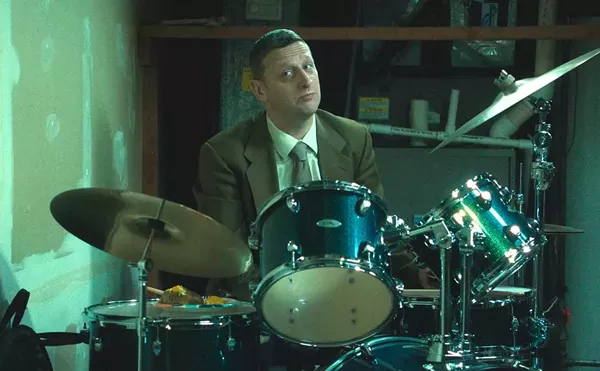
Audio By Carbonatix
[
{
"name": "GPT - Leaderboard - Inline - Content",
"component": "35519556",
"insertPoint": "5th",
"startingPoint": "3",
"requiredCountToDisplay": "3",
"maxInsertions": 100,
"adList": [
{
"adPreset": "LeaderboardInline"
}
]
}
]
According to Tolstoy, “Happy families are all alike; every unhappy family is unhappy in its own way.” This statement holds true for one of the American stage’s really unhappy families, the Wingfields of Tennessee Williams’ The Glass Menagerie. The play that put Williams on the map is now being staged as the first show of Planet Ant Theatre’s new season, in a production that takes some unusual dares with mixed results.
Set in the late 1930s, Menagerie chronicles the last days of the Wingfields, a fading Southern middle-class family now eking out an undistinguished existence in a dingy alley flat in a St. Louis tenement. The mother, Amanda Wingfield, is a delusional former Southern belle who pesters and worries over her children, Tom and Laura. Guided by her illusions, she goads her son, an aspiring poet, to earn the family’s keep in a shoe warehouse, and tries in vain to vicariously live out her dreams of courtship by prodding her disabled recluse of a daughter to attract suitors. She clutches not only to her children but to dreams of social respectability, gentlemen callers, plantation airs, and the vanishing vestiges of “gracious living” complete with “darky” servants.
But Mother is not the only Wingfield living a life of illusions. Stunted by work and henpecked at home, Tom spends his nights “at the movies,” palliating his thirst for adventure with picture shows and booze. Laura fusses over her collection of glass figurines and listens to worn phonograph records. At one point, Tom wonders if people don’t go to the movies “instead of moving.”
Menagerie is a rich play about the illusions we live by, and the death of those illusions. Despite the gloom, though, Williams has some fun with the theme of the future conquering the past. Contemporary audiences will still be delighted by the hilarious incongruities that this tragic play provides. For instance, when Amanda Wingfield lives out her fantasy of entertaining callers, she shoehorns herself into an old cotillion dress and rushes around the flat with her back unfastened. It’s at once hilarious and succinct.
And, as the quote from Tolstoy suggests, what makes the Wingfields unique is what makes them unhappy. Williams’ play as written places on the wall a picture of Pa Wingfield, gone these 16 years. Close at hand is the high school yearbook, from the school where social nonentity Laura failed to graduate. Props like the placid animals or the picture of the errant patriarch assume an almost magical significance, and the leg brace that Laura must wear points to some deeper disability.
This is what makes Planet Ant’s production of Menagerie so unconventional, as director Travis Reiff has eliminated these props entirely. In place of the photo of Dad hangs an empty frame. Instead of a case of glass animals we see an empty tray. Laura lumbers around with an imaginary leg brace. While it’s difficult to get used to the absence of these important props, the allegorical importance is all that remains, and it makes some sense in a world of people haunted by phantoms and encumbered with mirages.
The play opens with a monologue from Tom, who explains that Menagerie is a “memory play” and therefore must be dimly lit, as though peering into the past. In a play concerned with illusions, lighting is important. Lighting designer Eric Maher makes excellent use of low-key lighting to sink the play deeper and deeper into twilight as the world disintegrates into a memory. In an intimate “black box” theater, the intentionally dim lighting creates a very special place. As the last scenes of the play are plunged into a blackout, Maher keeps a candlelit scene hovering in a luminous darkness as the play nears its resolution.
Yet some baffling design choices make for an uneven production. Though lighting design providently includes flashing lights that suggest the seamy underbelly of the city, the spiffy set design lacks grit, and the sound design would have us believe that the Wingfields’ played-out record collection produces crystal-clear notes, and that the Paradise Club across the alley features a ’70s fusion combo, a jarring anachronism given the otherwise period setting.
The cast does an able job of playing these stowaways from the past, with Susan Berg giving an energetic, sometimes feverish performance as the chattering and smothering Mother Wingfield. York Griffith plays Tom, unleashing some convincingly volatile outbursts as the protagonist and narrator, although often affecting a cool disdain that seems a bit out of place in the role.
Two unusual casting choices make for further mixed results. Joel Mitchell, frequently cast on local stages as a blustering badass, is cast against type as the go-getting gentleman caller, and gives an understated yet moving performance, including humorous nuances. Jessica Cloud captures the haunting naïveté and vulnerability of Laura skillfully, but it seems an odd choice to cast Cloud, an eye-catching beauty, in the role of the dowdy and diffident girl who has to wait for the electric company to shut the lights out before she’s told by the “gentleman caller” that she’s pretty. Then again, is her homeliness, like her leg brace, simply imaginary? It’s a close call.
If some of the choices seem strange, it’s encouraging to see local producers with the courage and support to follow their instincts and take some risks. Menagerie is not only a rich and meaningful play, but one that gives up its secrets gracefully, and this production does a good job of turning it into moving drama. But it’s closing before mid-October, so potential theatergoers should stop by Hamtown before the Menagerie fades into the past.
The Glass Menagerie is playing at Planet Ant Theatre, located at 2357 Caniff, Hamtramck. It runs through Oct. 12; show times are 8 p.m. Thursday- Saturday, 2 p.m. Sunday. Tickets $15, students $10.
Michael Jackman is a Detroit-based freelance writer. E-mail letters@metrotimes.com




